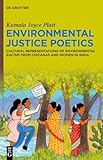Environmental Justice Poetics : Cultural Representations of Environmental Racism from Chicanas and Women in India / Kamala Joyce Platt.
Material type: TextPublisher: Berlin ; Boston : De Gruyter, [2023]Copyright date: ©2023Description: 1 online resource (XVIII, 391 p.)Content type:
TextPublisher: Berlin ; Boston : De Gruyter, [2023]Copyright date: ©2023Description: 1 online resource (XVIII, 391 p.)Content type: - 9783111041100
- 9783111042060
- 9783111041575
- Environmental justice
- Environmental racism
- Environmentalism in literature
- Poetics
- Social justice in literature
- Kulturpoetik
- Umweltgerechtigkeit
- Umweltrassismus
- intersektionaler Feminismus
- LITERARY CRITICISM / American / Hispanic American
- cultural poetics
- environmental justice
- environmental racism
- intersectional feminism
- 820.936 23
- PN56.E638 .P538 2023
- online - DeGruyter
- Issued also in print.
| Item type | Current library | Call number | URL | Status | Notes | Barcode | |
|---|---|---|---|---|---|---|---|
 eBook
eBook
|
Biblioteca "Angelicum" Pont. Univ. S.Tommaso d'Aquino Nuvola online | online - DeGruyter (Browse shelf(Opens below)) | Online access | Not for loan (Accesso limitato) | Accesso per gli utenti autorizzati / Access for authorized users | (dgr)9783111041575 |
Frontmatter -- Acknowledgements -- Table of Contents -- Preface -- Introduction -- Part I: Cultural Poetics in Environmental Justice Movements: Organization, Theories, and Resistance in India and Greater Mexico -- 1 Building Movements, Building Theory: Organizing, Resistance and Social Environmentalism -- 2 Environmental Justice: Coining a New Social Movement -- 3 Narratives of Social Environmentalism: Environmental Justice, Transformative Culture, Narmada Bachao Andolan and People Organized in Defense of the Earth and her Resources (PODER) -- 4 Mothers in the Hood: Latinas Serve and Protect East L.A. -- 5 Chipko: Human(e) Arms to Defend Lifestyle and Environment -- 6 Bhopal: Writing Tragedy as Ultimatum for Change -- 7 Representing Bhopal -- Part II: Women Write Environmental Justice: The Literary Tradition in India and Greater Mexico -- 8 So Close to the United States: Environmental Injustice and the Death of Fe in the “Land of Enchantment” -- 9 India’s Forests and the Interconnected Legacies of Environmental Degradation and Colonialism -- 10 Chicana/o Poetics: Farm Workers United Against Pesticides and City Dwellers Organized Against Toxins -- 11 A Farm Worker’s Blue Cape: Testimonio and Teatro -- 12 Mahasweta Devi’s Short Stories: Tribal and Peasant Peoples in Environmental Struggles in Bihar and Bengal -- 13 Contested Seeds and Imaginary Maps -- Epilogue: The Pedagogical Implications of Studying Environmental Justice Literary and Cultural Poetics -- Afterword: Environmental Justice Cultural Poetics, a Blueprint for Climate Justice -- Works Cited and Selected Bibliography -- Index
restricted access online access with authorization star
http://purl.org/coar/access_right/c_16ec
This book is an interdisciplinary comparative investigation of activist, artistic, literary, and academic discourse—expressive work promoting ecological justice, ending racism, and representing self and community through virtual realism—a cultural poetics of environmental justice. Research fixed on women’s work intervenes in patriarchal assumptions. Focus on marginalized areas in India and a U.S. movement led by people of color, defies racisms, and promotes vigilance against structural violence that permeates across political spectrums. Striving for environmental justice is not just community work, merely academic, or trendy art, performance, or literature. Environmental justice work demands interdisciplinary, transnational, transcommunity sharing, many border crossings and solid alliance-building. Chicanas and women in India engaged in such activities generate a rich cultural poetics—a transformative vision of environmental equity, ecological and civic wellbeing, and calming climate.
Issued also in print.
Mode of access: Internet via World Wide Web.
In English.
Description based on online resource; title from PDF title page (publisher's Web site, viewed 26. Apr 2024)


